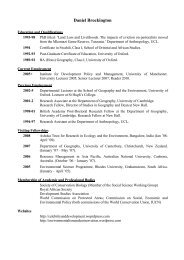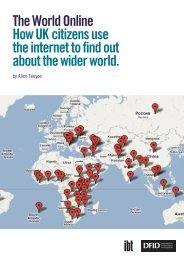World
Viewing the world - Full report
Viewing the world - Full report
- No tags were found...
You also want an ePaper? Increase the reach of your titles
YUMPU automatically turns print PDFs into web optimized ePapers that Google loves.
G. Production Study (3WE)G.1.G.1.1.IntroductionThe Purpose of the Production StudyThe purpose of this study was to conduct interviews withkey decision-makers within the British televisionindustry in order to understand the industry perspectiveon television coverage of the developing world.It is widely assumed that television helps inform andshape public understanding of world affairs. But thecommercial, multi-channel climate that dominatesBritish television today has raised questions about therole of television in adequately fulfilling this role. In aratings-led market the requirement to entertain andattract as many viewers as possible can appear to elbowout those other traditional Reithian concerns: to informand enlighten the public.This study therefore asks policymakers andprogramme-makers responsible for television output(mostly factual and news programmes) what type ofwindow on the world television is providing or seeking toprovide, with particular reference to its coverage of thedeveloping world.The term ‘developing world’ is used here to cover theleast developed peoples and nations of the world. Thiswas generally assumed by most interviewees to includemuch of Africa, Latin America, Asia and Eastern Europe.The study was commissioned by the Department forInternational Development to complement audienceand content research conducted by the GlasgowUniversity Media Group, also focusing on developingworld output.G.1.2. MethodThe study selected 38 interviewees from the five Britishterrestrial channels and four satellite/cable channels(Sky One, Sky News, Discovery, National Geographic). Afull list of participants follows this Introduction.The interviewees include decision-makers fromDirectors of Programmes and Channel Controllersdown, through Heads of Department and Series Editors,to programme makers and news correspondents. Thisrepresents a range of levels in the programme-makinghierarchy, but the majority were in the uppercommissioning levels, since these have the mostinfluence on programme output.For purposes of collation the interviewees are broadlydivided between policymakers/commissioning editorsand programme-makers. The latter grouping includesprogramme providers like the controllers of programmesfor Granada and Carlton TV as well as producers andjournalists. Where appropriate news staff are sometimesdifferentiated from non-news staff.Interviews generally lasted for about an hour, andinvited the interviewee’s thoughts on the following areas:1) The nature of their output about the developingcountries – broad questions including quantity andpositioning of programmes in the schedules.2) Detailed examination of the criteria used inpursuing programmes/news items on thedeveloping world – and the rationale behind therelevant criteria.3) Features associated with successful output on thedeveloping world (such as style, scheduling, content,finance).4) Representation issues: interviewees’ perception ofthe accuracy and fairness with which theirprogrammes depict the developing world, andproblems relating to this.5) Personal programme preferences and opinions,including beliefs about television’s role to informand the protection of public service ideals.It was stressed that the research project is openended,with no hidden agenda, and additional points ornew research avenues were welcomedIn addition to the 38 broadcasters and producersinterviewed, the survey also included interviews with fivedirectors of programme sales and advertising directors,so that the broader commercial context could beconsidered.G.1.3. ContextWhile reading the findings of this survey it could behelpful to recall some of the current debates and eventstaking place in the broadcasting industry in the first halfof 1999 when the interviews were undertaken, and whichmay well have influenced some interviewee responses.These include:● The ITC putting pressure on ITV to meet its newsand current affairs obligations, especially as ITVrescheduled its evening news programmes● The BBC’s licence under independent review● The BBC seeking a new Director General, giving riseto much debate about the BBC’s public service roleand its future148 DFID – July 2000





